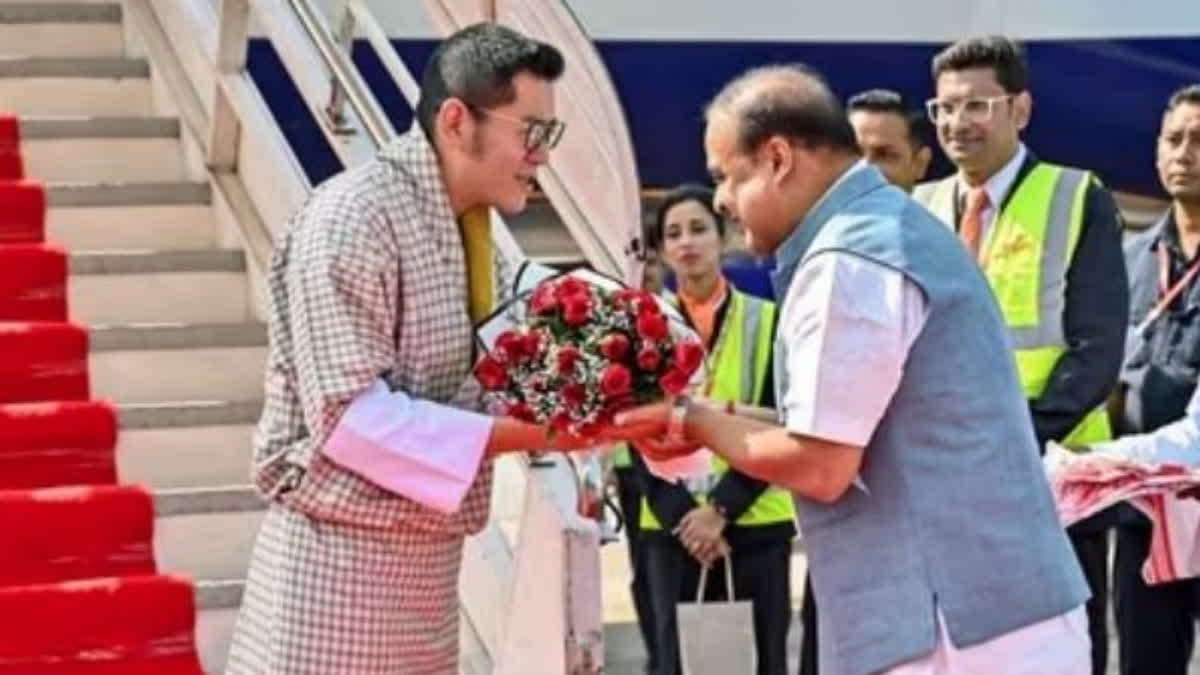New Delhi: When Monarch of Bhutan Jigme Khesar Namgyel Wangchuck started his current visit to India via the northeastern state of Assam, he gave a clear signal as to how India’s northeastern region has assumed importance for the Himalayan kingdom.
The Monarch’s visit comes even as Bhutan is headed for parliamentary elections months from now and a caretaker government is in place in Thimphu. In other words, Wangchuk is currently the head of the government of his country. What is also important to note is that Wangchuk landed in Guwahati just a fortnight after Bhutan and China signed a boundary delimitation agreement in Beijing.
The visit is meaningful in several ways, including the prospect of forging improved relations, especially for those living along the border. The sense of hope and aspiration arises from past occurrences, recognising the missed opportunities that spanned several decades. The Assam-Bhutan border, extending 267 km and featuring settlements on both sides, has the potential for numerous benefits that, for various reasons, remained unexplored. Issues like insecurity, mistrust, and a lack of recognition of opportunities have negatively impacted people on both sides of the border.
From difficulties such as restrictions on the transport of essential goods by Bhutanese people across the border in the 1970s to the persistent threat of militancy, the potential of people on both sides was stifled. In fact, the former King of Bhutan and Wangchuk’s father played a direct role in flushing out northeastern militants taking refuge in the kingdom.
Today, the perception of the Northeast in neighbouring countries like Bhutan and Bangladesh has changed. Earlier, these countries used to look at the Northeast through the security lens. They were adversely affected by security issues in the northeastern region of India.
“That thinking is beginning to change,” K Yhome, Fellow in the Shillong-based Asian Confluence think tank, told ETV Bharat. “In recent years, the image of the Northeast among our neighbouring countries, barring Myanmar, has been undergoing changes.”
Yhome said that the reason why Northeast has become important for India’s landlocked neighbours like Bhutan and Nepal is because it provides the transit to reach the sea. This will help these countries expand the market of their products via the ports in Bangladesh.
Secondly, the Northeast itself has become a large market for Bhutan because of a growing middle class population with increasing purchasing power capacity. Opportunities are abundant. Plans are underway to upgrade the Gelephu domestic airport to an international airport. Furthermore, efforts are being made to develop Sarpang into a unique special economic zone for Bhutan, which offers opportunities for people on both sides of the border. Instead of going to distant places like Bangalore, Mumbai, Delhi or Gujarat, Bhutan can sell its products just next door. This is the kingdom’s closest market. This will cut down transportation costs.
Bhutan will also be interested in the growing infrastructure of the Northeast. This has become easier for the Bhutanese people to navigate the region. Another reason is the similarities in culture and people-to-people ties between Bhutan and India’s northeastern region. These include food and the Buddhist culture.
“A Bhutanese person going to Mumbai or Delhi will feel that place to be more foreign,” Yhome said. “However, they will find it more comfortable coming to the Northeast.” In a goodwill gesture, the Assam Cabinet announced the reservation of medical college seats for Bhutanese nationals ahead of the royal visit. This move is seen as a positive step toward strengthening the ties between Bhutan and Assam and fostering a more harmonious future for the entire region, as Assam Chief Minister Himanta Biswa Sarma has expressed.
Also read:


